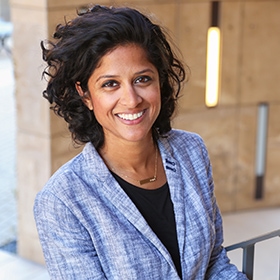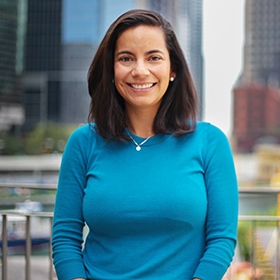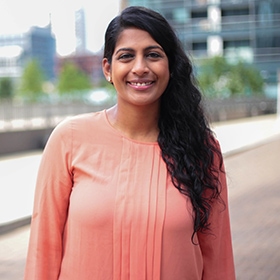How We’re Supporting From Afar
By L'Oreal Payton
May 11, 2020
There’s no doubt the world we live in now looks drastically different from the one we occupied prior to the outbreak of COVID-19. As school districts across the country pivoted to distance learning and many decided to close for the remainder of the school year, we’ve shifted the way we do our work as well. In the third part of our Forward Together series, we share how our staff members are supporting students and teachers during these unprecedented times.
Renowned poet and author Maya Angelou once said, “I’ve learned that people will forget what you said, people will forget what you did, but people will never forget how you made them feel.” It’s a sentiment that OneGoal staff members are striving toward in daily interactions with students and teachers. Read on to learn more about how our staff is coaching Program Directors and ensuring Fellows still have an equitable opportunity to achieve their greatest postsecondary aspirations.

Payal Kapadia, Senior Director of Curriculum and Coaching in New York
“Before COVID-19, I was in schools three days a week,” Kapadia shared. “Now I’m joining classrooms virtually. I’m checking in with our Program Directors over video chat, email or text. I’m working with the team on converting our classroom curriculum to a digital curriculum. We’re also building a student-facing website, offering office hours for students and teachers, as well as distributing forms to collect information that’s pertinent to supporting students.
One of the biggest things we do as a team is center trauma-informed practices and social-emotional care for teachers and students. We hardly know the exact experience for all of our students.
Quite a few Fellows haven’t been in touch, some have disclosed they’ve lost family members or have sick family members. So we’re thinking about what’s most urgent right now: are our students safe? Do they have access to food and other resources they need? We’re looking at Maslow’s hierarchy of needs, and the very base of the pyramid—physiological and safety needs—are not present for a lot of people right now.”
Nehia Al-Shanniek, Director of Teacher Support in Massachusetts
“A big part of my job is building relationships and community while ensuring students feel they are part of a cohort, because I believe we’re stronger together than we are alone.
There have been a few phases to how I’m approaching my work now. The first phase was crisis management—combing through hundreds of resources to determine which ones would be most helpful to teachers. The second phase was getting a better understanding of each school district’s plan. And the third phase was figuring out what kind of differentiated support Program Directors needed.
Right now, with our Year 1 students, there’s a greater focus on building community and making sure our Fellows have what they need to pursue their dreams. We understand that our Year 2 Fellows have different needs at the moment and we’re looking at what support will look like for all of our Fellows and Program Directors throughout the summer and into the fall.
My message of hope to students is: this is a season, and it will pass. Continue to find ways to fuel your passion—the opportunity for that to bloom is very close.”


Zuleica Lopez, Director of Teacher Support in the Bay Area
“None of us have been here before and there’s no way of knowing the immediate and lasting implications COVID-19 will have on all of us. Our approach has been primarily to connect with our Program Directors as humans—reach out, hold space to hear how they’re doing personally—and also as educators, sharing resources, showing gratitude and supporting them with distance-learning curriculum.
For our juniors, we’re prioritizing the rest of the school year to build out their best-fit lists for institutions and programs that are grounded in their strengths, values and aspirations. And for our seniors, we’re helping them make a decision on the institution or program that will help them best thrive after high school.
We’ve developed content to help them do that while also centering their wellbeing and continued need for community connection with exercises like mini-meditations and rose, thorn and bud reflections.”
Rohini Muralidharan, Director of Teacher Support in Metro Atlanta
“Before the pandemic, I spent two days in the office and the rest of my time in classrooms, debriefing with teachers and doing coaching work. Since the pandemic, that looks very different.
I’m still meeting with teachers and joining virtual classes when possible, but it’s harder to be in touch as frequently. This time has been especially challenging for teachers and students, so I’m seeking first to understand their needs and meeting people where they are. That’s been the theme of how I’m approaching my work right now.
The coaching nature of the work has changed. We’ve become more responsive to what teachers need and are playing more of a support role. We’re creating resources that teachers have asked for, including videos to complement our tools and curriculum.”
Help us continue our work toward closing the college degree divide across the country by donating here.
